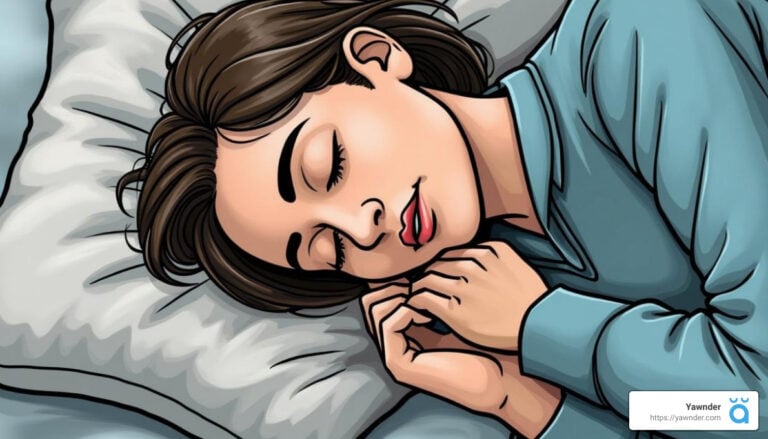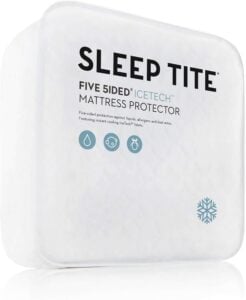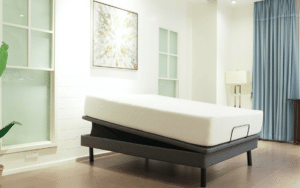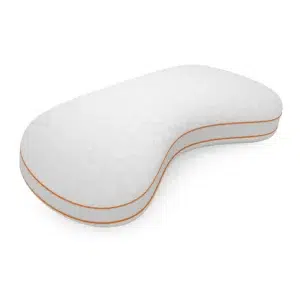Sleep Quiz: Top 10 Powerful Tips for Better Sleep in 2025
Why Assessing Sleep Quality is Essential
Taking a sleep quiz can be your first step toward better sleep. Understanding your sleep quality is like a health check-up for your nightly rest. Poor sleep can affect your overall well-being, leading to problems like lack of focus, mood swings, and even serious health issues.
Key Points:
-
Importance of Sleep: Sleep is as essential as food and air. A good night’s sleep can restore your immune function, improve athletic performance, and regulate your metabolism.
-
Sleep Disorders: Common sleep disorders like insomnia, sleep apnea, and narcolepsy can go unnoticed but deeply impact your life. Using a sleep quiz can help identify if you might have such issues.
-
Sleep Quality: The National Sleep Foundation found that more than one-third of U.S. adults aren’t getting the recommended amount of sleep, affecting their daily lives.
I’m Ben Trapskin, founder of Yawnder. My journey into understanding sleep began when poor sleep affected my well-being. Now, I aim to help others assess and improve their sleep quality, starting with a simple tool like a sleep quiz.

Sleep quiz basics:
– How to Keep a Sleep Journal
– Maladaptive Daydreaming
– Revenge Bedtime Procrastination
Understanding Sleep Quality
The Importance of Sleep
Sleep is as crucial to our health as food and air. It helps restore immune function, improve athletic performance, and regulate metabolism. According to the Centers for Disease Control and Prevention (CDC), adults need at least 7 hours of sleep per night to function well.
But why is sleep so important? During sleep, our bodies go through different sleep stages: non-rapid eye movement (NREM) sleep and rapid eye movement (REM) sleep. Each stage plays a unique role in maintaining our health. NREM sleep is when your body repairs tissues and strengthens the immune system. REM sleep, on the other hand, is essential for processing memories and emotions.
Lack of proper sleep can lead to sleep deprivation, which poses several health risks, including:
- Obesity: Poor sleep affects hormones that control hunger, leading to weight gain.
- Heart Disease: Chronic sleep deprivation can increase the risk of heart disease.
- Weakened Immune System: Lack of sleep can make you more susceptible to infections.
Common Sleep Disorders
Not all sleep problems are due to poor sleep habits. Sometimes, they stem from sleep disorders. Here are some common ones:
Insomnia
Insomnia is the most common sleep disorder, affecting about 1 in 3 people in the U.S. It is characterized by difficulty falling asleep or staying asleep. Insomnia can lead to daytime sleepiness, affecting your ability to function.
Sleep Apnea
Sleep apnea is a condition where your breathing repeatedly stops and starts during sleep. This leads to poor sleep quality and can result in daytime sleepiness. There are two types of sleep apnea:
- Obstructive Sleep Apnea (OSA): Caused by a blockage in the airway, often due to obesity or large tonsils.
- Central Sleep Apnea: Occurs when the brain fails to send proper signals to the muscles that control breathing.
Sleep apnea has been linked to serious health risks like heart disease, diabetes, and high blood pressure.
Snoring
Snoring is not just a noisy annoyance; it can be a sign of obstructive sleep apnea. It happens when the flow of air through the mouth and nose is partially blocked during sleep.
Sleep Debt
Sleep debt is the accumulated amount of sleep lost due to poor sleep habits or sleep disorders. Over time, sleep debt can lead to chronic sleep deprivation, affecting your physical and mental health.

Understanding these common sleep disorders can help you identify if you might be suffering from one. Taking a sleep quiz can provide initial insights, but consulting a healthcare professional is essential for a proper diagnosis and treatment.
In the next section, we’ll explore how to assess your sleep quality and what steps you can take to improve it.
How to Assess Your Sleep Quality
Taking a Sleep Quiz
Assessing your sleep quality starts with understanding your sleep habits. One effective way to do this is by taking a sleep quiz. These quizzes are designed to help you evaluate your sleep patterns and identify potential sleep issues.
Online screening tools like the one offered by the National Sleep Foundation can provide valuable insights. The quiz typically takes about 5 minutes to complete and asks questions about your sleep habits over the past four weeks. Here are some example questions you might encounter:
- How often do you have trouble falling asleep?
- Do you wake up frequently during the night?
- How rested do you feel upon waking up?
Interpreting Your Sleep Score
Once you complete a sleep quiz, you’ll receive a sleep score. This score helps you understand the quality of your sleep and whether you might have a sleep disorder. The scoring usually falls into three categories: low, moderate, or high risk for sleep disorders.
Sleep Score Ranges
- Low Risk: Your sleep habits are generally healthy, but there’s always room for improvement.
- Moderate Risk: You may have some sleep issues that need attention.
- High Risk: You should consult a healthcare professional for a thorough evaluation.
Your sleep score can act as a self-evaluation tool, but remember, it’s not a substitute for professional medical advice. If your score indicates potential problems, consider reaching out to a sleep specialist.
Sleep IQ and Sleep Debt Calculator
Some quizzes and apps also provide a Sleep IQ or a sleep debt calculator. These tools help you understand how much sleep you’re missing and what you need to do to catch up.
- Sleep IQ: Measures your overall sleep quality and efficiency.
- Sleep Debt Calculator: Estimates how much sleep you owe your body.

Assessing your sleep quality with a quiz is a great first step. Next, we’ll look at practical tips to improve your sleep quality.
Tips to Improve Sleep Quality
Establishing a Bedtime Routine
Creating a consistent bedtime routine can significantly improve your sleep quality. Here are some steps to get you started:
-
Wind Down Routine: Spend the last 30-60 minutes before bed doing calming activities. This can include reading, stretching, or meditating. Avoid stimulating activities like watching TV or playing video games.
-
Screen Time: Limit exposure to screens at least one hour before bedtime. Blue light from phones, tablets, and computers can interfere with melatonin production, making it harder to fall asleep.
-
Relaxation Techniques: Incorporate relaxation techniques such as deep breathing exercises, progressive muscle relaxation, or listening to calming music. These activities can help signal to your body that it’s time to unwind.
Optimizing Your Sleep Environment
Your sleep environment plays a crucial role in the quality of your sleep. Here are some tips to optimize it:
-
Mattress Quality: Invest in a supportive mattress that suits your sleep preferences. A good mattress can reduce discomfort and improve sleep quality.
-
Bedding: Choose comfortable and breathable bedding. Organic sheets can be beneficial as they are less likely to irritate your skin or respiratory system.
-
Room Temperature: Keep your bedroom cool, ideally around 68 degrees Fahrenheit. A cooler room can help you fall asleep faster and stay asleep longer.
-
Noise Control: Reduce noise as much as possible. Consider using earplugs or a white noise machine to drown out disruptive sounds.
-
Lighting: Use blackout curtains to keep the room dark. If you need a nightlight, choose one with a red or orange hue, as these colors are less likely to interfere with sleep.
Healthy Lifestyle Choices
Your daily habits and lifestyle choices can also impact your sleep quality. Here are some changes to consider:
-
Diet: Be mindful of what you eat and drink. Avoid heavy meals close to bedtime and limit caffeine and alcohol intake, especially in the evening.
-
Exercise: Engage in regular physical activity. Exercise can help you fall asleep faster and enjoy deeper sleep. However, try to finish exercising at least a few hours before bedtime to avoid being too energized to sleep.
-
Caffeine and Alcohol: Limit caffeine intake after midday and avoid alcohol close to bedtime. While alcohol might make you feel sleepy initially, it can disrupt your sleep cycle later in the night.
By following these tips, you can create a sleep-friendly environment and adopt habits that promote better sleep. Next, we’ll address some frequently asked questions about sleep to further improve your understanding.
Frequently Asked Questions about Sleep
What is the 10 rule for sleep?
The 10 rule for sleep is a guideline to help improve sleep quality by managing your intake of caffeine, food, and screen time. Here’s how it works:
- 10 hours before bed: Avoid caffeine. Caffeine can stay in your system for up to 10 hours and can interfere with falling asleep.
- 3 hours before bed: Avoid heavy meals and alcohol. Eating large meals or drinking alcohol close to bedtime can disrupt your sleep cycle and impact sleep quality.
- 1 hour before bed: Avoid screens. The blue light from electronic devices like phones, tablets, and computers can inhibit melatonin production, making it harder to fall asleep.
Following the 10 rule can help create a better environment for sleep by reducing stimulants and distractions before bedtime.
What is the 15 minute sleep trick?
The 15 minute sleep trick involves creating a strong bed-sleep connection. If you find yourself lying in bed unable to fall asleep, get up after 15 minutes. Here’s why:
- Get out of bed: If you can’t fall asleep within 15 minutes, get out of bed and do a quiet, relaxing activity like reading or listening to soft music.
- Return to bed: Only go back to bed when you feel sleepy.
This trick helps your brain associate the bed with sleep, not wakefulness. Over time, this can improve your ability to fall asleep quickly.
Is 92 a good sleep score?
A sleep score is a numerical representation of your sleep quality based on factors like duration, consistency, and disturbances. While different apps and devices have their own scoring systems, a score of 92 is generally considered very good.
- Sleep score ranges: Typically, sleep scores range from 0 to 100. Scores above 85 are usually considered excellent, indicating high-quality sleep.
- Sleep quality: A high sleep score means you likely had a good balance of light, deep, and REM sleep, with minimal interruptions.
If your sleep score is consistently high, it suggests that your sleep habits and environment are conducive to good rest.
By understanding and applying these concepts, you can better assess and improve your sleep quality. If you have more questions or concerns, consider taking a sleep quiz to further evaluate your sleep habits and seek professional advice if needed.
Conclusion
At Yawnder, we believe that understanding and improving your sleep quality is essential for overall well-being. Sleep isn’t just about resting; it’s about rejuvenating your body and mind to face each new day with energy and clarity.
Sleep Improvement with Yawnder
We’ve created resources like the sleep quiz to help you assess your sleep quality. This quiz is a starting point for identifying potential sleep issues. While it’s not a diagnostic tool, it can provide valuable insights into your sleep habits and highlight areas that may need improvement.
Seeking Professional Help
Only a healthcare professional or sleep specialist can provide an accurate diagnosis and recommend a treatment plan if you suspect a sleep disorder. Whether it’s insomnia, sleep apnea, or another sleep issue, professional guidance is crucial for effective management.
Better Sleep Quality
Improving sleep quality starts with understanding your sleep patterns and making necessary changes. From adjusting your bedtime routine to optimizing your sleep environment, small steps can lead to significant improvements. Consider integrating tips like the 10 rule for sleep and the 15 minute sleep trick into your nightly routine.
Yawnder is here to support you on your journey to better sleep. Explore our resources, take the sleep quiz, and connect with our community of sleep experts and fellow sleepers. Prioritize sleep, and watch your life transform for the better.
For more information and personalized sleep recommendations, visit Yawnder and take the first step towards a healthier, more restful life.
By committing to better sleep, you open up numerous benefits for your health and well-being. As William C. Dement wisely said, “Sleep is the golden chain that ties health and our bodies together.” Let’s make sleep a priority and enjoy the positive changes it brings.



















